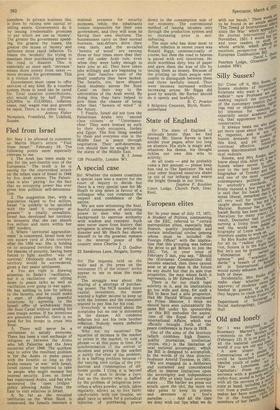Fled from Israel
Sir: May 1 be allowed to comment on Martin Short's article "Fled from Israel," February 19. The following points seem especially relevant to me:
1. The Arab has been made to pay for the anti-Semitic sins of the Europeans." The truth is he is paying for the unprovoked attack on the infant state of Israel in 1948 by five Arab armies. The Palestinian is also ' paying ' for the fact that no occupying power has ever given him political self-determination. 2. The suggestion that, with a population raised to five million, Israel "is unlikely to be satisfied with the land it occupies at present" is totally unrealistic. Israel has developed her territory so intensely that she can absorb five million and more within her 1967 borders.
3. Where 'territorial aggrandisement ' is concerned, Israel took not one square yard of Arab territory after the 1956 war. She is holding on to occupied territory this time for reasons of security, having been forced to fight another 'war of survival.' Obviously much of this territory would be surrendered, given a fair peace settlement.
4. You are right in drawing attention to Sadat's 'vacillation,' but it is vacillation over sitting down to peace talks as well as vacillation over going to war again. He has nothing to lose by talking to the Israelis, and he could make a start of showing peaceful intentions by agreeing to the Israeli offer of withdrawal from the Suez Canal without sending his own troops across. If his intentions are genuinely peaceful, there is no need for his troops to cross into Sinai. 5. There will never be a settlement to satisfy everyone. There has been a vast exchange of refugees as between the Arabs who left Palestine and the Jews countries after 1948. The quickest way to solve the resultant problem is for the Arabs to make peace with the Israelis: so long as the Arabs remain 'at war' with Israel, Israel cannot be expected to take in people who might menace her internal security. Even so Israel has repatriated Arabs, and has also sponsored the 'open bridges' policy allowing Arabs from the East to visit relatives in Israel. 6. So far as the occupied territories on the West Bank is concerned, the Israelis maintain a minimal presence for security purposes, while the inhabitants remain responsible for their own government, and they will soon be having their own elections. The businessmen carry on their normal business, taxi-drivers drive their own taxis, and the so-called hewers of wood' are earning three or four times more than they ever did under Arab rule, even when they were lucky enough to have jobs at all. They have taken jobs willingly and are beginning to give their families some of the small comforts they have lacked. The Israelis, too, have shipped Gaza students across the Suez Canal on their way to the universities of the Arab world. By doing this, they have helped to give them the chance of being other than "hewers of wood" in the future. 7. Finally, Israel did not turn the Palestinian Arabs into second class citizens' or " Untermenschen.' They were treated as such by their Arab occupiers, Jordan and Egypt. The first thing needed by them and everyone else in the Middle East is peace through negotiation. Their self-determination should then be sought by all the states of the Middle East.
R. I. Jones 128 Piccadilly, London WI.










































 Previous page
Previous page